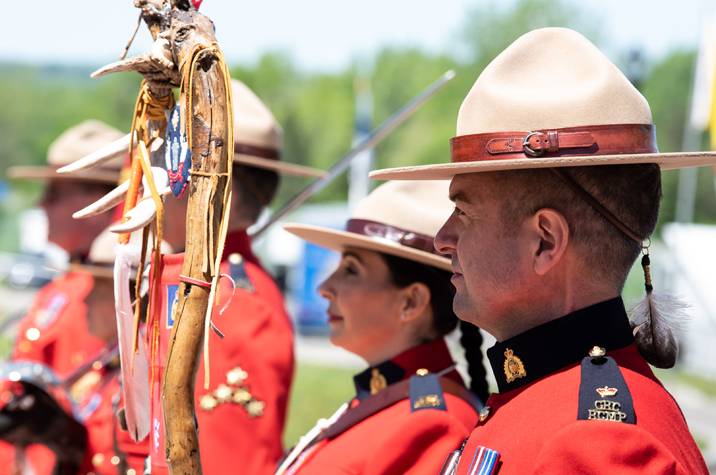The path to reconciliation is to listen and learn "from the heart"

RCMP Inspector Eric Sheppard's work to challenge systemic racism and build awareness started with reconnecting to his own First Nations heritage.
Image by RCMP
July 11, 2024
Content
As part of an agency-wide commitment to reconciliation, front-line RCMP officers are spending time in Indigenous communities, ready to listen and learn. "We must demonstrate that our intentions to walk a good path as peacemakers are pure and from the heart, not just to earn a pay cheque," says Inspector Eric Sheppard, officer-in-charge of Indigenous Relations Services. "Being a peacemaker is a calling, one that is honourable, but comes with a great weight of responsibility."
The RCMP's present-day approach to Indigenous relations can be traced all the way back to the early days of policing in Canada.
"Those first members of the North West Mounted Police knew they weren't going to make it very far without help from the local First Nations and Métis translators, scouts and guides," says Sheppard. "It came down to a group of men in a foreign place facing the sobering reality that their very survival and ability to carry out their duty depended on being part of the local community. 'Listen and learn' was the mantra back then and is one we should be returning to with respect and humility as an organization."
Inspired to learn from Elders
Sheppard is Ojibway and a member of the Dokis First Nation along the French River near Lake Nipissing in south-central Ontario. Growing up off-reserve, he was inspired to learn more about his First Nations heritage after joining the RCMP.
"Early in my career, there were many distasteful comments said to me from other employees and, at times, overt racism against Indigenous people, so I kept my heritage quiet," Sheppard admits. "But a near-death experience triggered a spiritual journey that has totally changed my perspective and opened my eyes."
In 2007, he was diagnosed with a rare form of cancer that required major surgery. While recovering in hospital, a mistake by a healthcare worker led to a morphine overdose. "In that moment, so close to dying, I understood how everything is connected," he recalls. "I finally understood where the teachings from my Elders had come from. It gave me the courage to be proud of my heritage and to share our story."
A new destiny
Sheppard turned to his Elders for guidance and knowledge to help build awareness, challenge systemic racism, and positively influence RCMP culture.
"One of my Elders had always said that my path was that of a peacemaker who would tell our story but that the path would only be revealed to me when I was ready. I always wondered what she meant," he says. "Then I received my commission as the officer in charge of the RCMP's Indigenous Relations Services. This is my path."
Looking ahead, Sheppard says the perfect state of reconciliation will come only when there's no longer a need to talk about it. "Can we see a time in the future where we can take down the border signs on our reserves or no longer feel that at every turn we have to define, defend and legitimize to the future generations who we have always been? That path remains unlit for now."